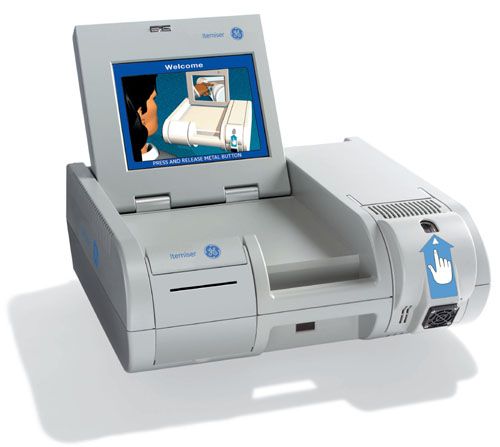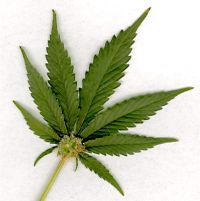 |
Look out, hostile rhesus monkeys of the world: weaponized ketamine may be coming your way!
A Czechoslovakian lab has reported success testing new mixes of sedatives and ketamine, an illicit "dance party" drug, to pacify hostile rhesus monkeys, and proposed the cocktail could be used as a behavioral weapon in combat....
The idea to use drugs against aggression in combat is not new, but the Czech study is notable for its findings and its public disclosure, Dumiak reported. "While Russian, Chinese and American scientists may have similar lines of study, the Czechs are brazen enough to go on scientific record," he wrote, adding, "more than one American researcher connected with the military thinks [the] presentation is compelling."
It gets better:
The Czech researchers, who compare the global spread of aggression today to epidemics of infectious disease in the Middle Ages, were most impressed with the effect of a naphtylmedetomidine-ketamine mix to induce calming, non-violent behavior in their subjects.
"We achieved complete manipulability of the animal, with low motoric sedation," said Jitka Schreiberova, one of the study leaders. In addition to the pharmacological results, their report also addressed weapon delivery system options such as dimethyl sulfoxide (DMSO) laced paintball-like projectiles.
And so, we see the future unfolding: DMSO paintballs splattering sedatives and ketamine all over battlefields, to achieve "complete manipulability" of enemy soldiers. There's a Pete Doherty joke in here somewhere, but I'm not sure it's worth the effort. At any rate, psychedelic history is littered with apparent efforts to weaponize various substances, with little degree of success by most accounts. However, it's not entirely surprising to imagine ketamine in this kind of context. But it does make me wonder if "K hole" training will become de rigeur as a method for surviving an attack like this...
 |
Amidst the mayhem of the recent GHB toy scares, Erowid contributing editor Lux noted, "This has been an interesting year for GHB. In addition to this toy issue and the Dr. Bronner's Soap scandal, a study in a forensics journal found that clean samples of urine stored in refrigerators for 6 months spontaneously produced enough GHB to test positive with standard tests."
This study was designed to supplement previous studies that documented in vitro production of gamma-hydroxybutyrate (GHB) in urine samples. Urine samples were provided by subjects who reported that they had never used GHB (n=31). The specimens were stored under standard conditions of refrigeration (5 degrees C) without any preservatives added. All specimens were repeatedly analyzed for the presence of endogenous GHB over a 6-month period using a previously reported headspace GC-MS method. Significant elevations in GHB were observed in many of the urine samples as storage time increased. As a result, the in vitro production of GHB may increase the apparent GHB concentrations in urine during storage. This potential for an artificial increase in GHB concentration must be appreciated when establishing the threshold between endogenous and exogenous concentrations of GHB.
Wacky! I can see this overtaking jenkem as the homemade drug craze du jour...
 |
According to a recent study, ADHD may be under-diagnosed:
The research team used the fairly new standard for ADHD diagnosis found in the fourth and latest edition of the Diagnostic and Statistical Manual for Mental Disorders (DSM-IV). This is the first study to use this standard to calculate ADHD's prevalence in the population. According to the researchers' application of the standard, 2.4 million children between the ages of eight and 15 have ADHD — 9% of all children in that age group. Only 48% of these have been diagnosed with ADHD, and only 32% receive drug treatment.
This hits the news now despite an increasingly popular sense that ADHD drugs are actually over-prescribed. As it turns out, this particular study was funded in part by a group with "close financial and policy ties with the pharmaceutical industry," and criticism of the research has quickly bubbled up, centering around how ADHD is potentially being "redefined" on essentially a semantic level, without a correlate in terms of actual biological evidence:
Since ADHD does not have any strictly biological markers the way diseases like diabetes and cancer do, its definition is — or was — based on statistical rarity. By definition, ADHD is a disorder in which children act more hyperactive, less attentive, etc., than other children their age.... "Unless a biological marker is identified, an agreed-upon gold standard diagnostic procedure is established, or ADHD is redefined, a population-based ADHD rate exceeding 3% to 5% by definition represents a problem of ADHD over-diagnosis." The recent study may indicate that just such a redefinition of ADHD is occurring.
Of course, an increase in diagnoses will mean an increase in prescriptions, but as this news report and others indicate, the current slate of ADHD drugs offers no magic bullet:
The study's authors also treated it as a given that stimulant drugs are the most effective treatment for ADHD. Recent scientific evidence tells a different story. Ritalin, the most popular ADHD drug, improves children's behavior in the short term, but the advantage compared to behavioral intervention wears off within three years. A major study demonstrated this in August's Journal of the American Academy of Child and Adolescent Psychiatry. After three years, children who receive only behavioral intervention are as well-behaved as those who take drugs, and have several advantages: they have learned to control their symptoms on their own, and have avoided the side effects of Ritalin, which include stunted growth. This news, however, made less of a splash than the 9% study. Just days after the study's publication, various researchers and practitioners called out for more children to go on ADHD drugs.
I didn't expect I'd want to return to this story, but from a purely forensic, "how did this story originate in the first place?" perspective, Salon has a good analysis of how jenkem caught on with the popular media, if not with hordes of American school children:
Internet investigators, including About.com urban legend guru David Emery, pounced, ultimately tracing its sordid photos to, of all places, a discussion thread on Totse.com, a Web community where content ranges from tutorials on how to make poisonous gas to essays on "UFO terrorists."
There, a user operating under the pseudonym "Pickwick" famously staged the jenkem-huffing scene back in June (or so he says; he came clean in September, claiming that his "jenkem" consisted of little more than dough rolled in Nutella hazelnut chocolate spread).
It's just that easy!
Reason Magazine alerts us to another promising note on the medical marijuana front:
The Assembly of the American Psychiatric Association, a legislative body composed of representatives from APA districts throughout the country, has unanimously approved an action paper that urges the federal government to stop interfering with the medical use of marijuana in states where it's legal.... Abraham L. Halpern, professor emeritus of psychiatry at New York Medical College and past president of the American Academy of Psychiatry and the Law, called the vote "a landmark," adding, "As physicians, we cannot abide our patients being subject to arrest and jail for using a physician-recommended treatment that clearly relieves suffering for many who are not helped by conventional treatments." Rob Kampia, executive director of the Marijuana Policy Project, says the action paper's unanimous approval "shows the growing acceptance of medical marijuana by organized medicine."
And in the "complete and total outrage" department, it seems that you may not be able to rely on the label "decaf" as it pertains to your average cuppa drip coffee:
A recent Consumer Reports unscientific experiment near its headquarters in Yonkers, N.Y., found that while most of the local coffee-serving chains' decaffeinated offerings were practically caffeine-free, others racked up significant amounts of the stimulant.
One Dunkin' Donuts outlet's small cup of decaffeinated coffee delivered 32 milligrams of the energizer. That means two small servings had almost as much caffeine as a normal cup of coffee, which usually has 100 milligrams, according to Consumer Reports.
There oughta be a law against this kind of over-stimulation of the general public! Where is the Congressional investigation??
TIME Magazine has a small feature on the various measures which passed this election cycle easing local laws on marijuana and hemp. Check it out if you are interested in learning more about the people who made it all happen.
 |
As time marches on some places become more and more backwards, like Algeria, where exorcism and faith healing are on the rise:
The phenomenon of exorcism is a growing force in Algerian society, with many seeking aid from spiritual healers when traditional medicine is unavailable or unaffordable.
Such healers – known as raquis – practice roquia, or rituals used for purposes ranging from curing headaches to relieving a soul from demonic possession... Roquia has become a highly respected therapy among some Algerians.
In the case of people possessed by djinn or under curses, some raquis resort to magic and witchcraft. Such practices include hypnotising the patient, invoking God and watching to see whether the patient’s left hand moves, to confirm that they are haunted by a djinni. If necessary, the healer touches the hand to ascertain exactly which part of the body is haunted.
These methods are not universally approved by those practising roquia. Some feel that the inclusion of djinn or magic is wrong, particularly where the patients say they have fallen victim to a talisman, curse or evil eye.
Hmm. I sense a deep metaphysical dispute in the roquia community over how to deal with djinni, talismans, and evil-eyes. I demand a raqui throw-down right now; who's got the fatter ju-ju? Bring it to the table and let's see you take on my evil occult skull talisman. Huh? What's that? You're scared? Algeria, you've officially been served.
Wielding two oriental swords in public, Drugpsychosis Man was confronted by local authorities and arrested. In his defense, he plead this case:
The court heard that from the age of 16 [Drugpsychosis Man] had taken a mixture of cannabis, ecstasy, speed and Ketamine which had caused his problems, but still clearly understood right from wrong.
Tune in next week for the further adventures of Drugpsychosis Man!

File under yikes!
The machine can test up to 200 different types of drugs including cocaine, heroin, cannabis, amphetamine and ecstasy. A swab is wiped across a person's palm and placed in the Itemiser, giving a result in ten seconds.
PC Tuck said: "The positive readings show that the person has physically come into contact with illegal drugs - it does not mean they have ingested the substances. It may be that they have unintentionally been in contact with someone who handles drugs, or surfaces that have drug traces on them.
"If the Itemiser detects traces of drugs, it gives the police grounds to carry out a search of the person to see if they are in possession of controlled substances."
This lovely device was made by GE, and may soon be used at your local airports, pubs, schools, grocery stores, shopping malls, subway stations, churches, and so on. Get used to the swab people. They're coming for you.
|

Recently @ DoseNation
|
|

















